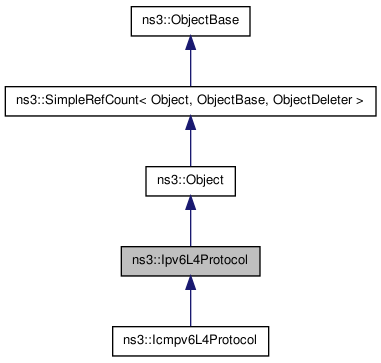IPv6 L4 protocol abstract class. More...
#include <ipv6-l4-protocol.h>
Inheritance diagram for ns3::Ipv6L4Protocol:

Collaboration diagram for ns3::Ipv6L4Protocol:

Public Types | |
| enum | RxStatus_e { RX_OK, RX_CSUM_FAILED, RX_ENDPOINT_UNREACH } |
Status of receive. More... | |
Public Member Functions | |
| virtual | ~Ipv6L4Protocol () |
| Destructor. | |
| virtual int | GetProtocolNumber () const =0 |
| Get the protocol number. | |
| virtual enum RxStatus_e | Receive (Ptr< Packet > p, Ipv6Address const &src, Ipv6Address const &dst, Ptr< Ipv6Interface > incomingInterface)=0 |
| Receive method. | |
| virtual void | ReceiveIcmp (Ipv6Address icmpSource, uint8_t icmpTtl, uint8_t icmpType, uint8_t icmpCode, uint32_t icmpInfo, Ipv6Address payloadSource, Ipv6Address payloadDestination, const uint8_t *payload) |
| ICMPv6 receive method. | |
Static Public Member Functions | |
| static TypeId | GetTypeId (void) |
| Get the type identifier. | |
Detailed Description
IPv6 L4 protocol abstract class.
Member Enumeration Documentation
Member Function Documentation
| virtual int ns3::Ipv6L4Protocol::GetProtocolNumber | ( | ) | const [pure virtual] |
| static TypeId ns3::Ipv6L4Protocol::GetTypeId | ( | void | ) | [static] |
Get the type identifier.
This method returns the TypeId associated to ns3::Ipv6L4Protocol.
- Returns:
- type identifier
This object is accessible through the following paths with Config::Set and Config::Connect:
- /NodeList/[i]/DeviceList/[i]/$ns3::AlohaNoackNetDevice/Phy/$ns3::Ipv6L4Protocol
- /NodeList/[i]/DeviceList/[i]/$ns3::BaseStationNetDevice/BsIpcsPacketClassifier/$ns3::Ipv6L4Protocol
- /NodeList/[i]/DeviceList/[i]/$ns3::BaseStationNetDevice/LinkManager/$ns3::Ipv6L4Protocol
- /NodeList/[i]/DeviceList/[i]/$ns3::BaseStationNetDevice/SSManager/$ns3::Ipv6L4Protocol
- /NodeList/[i]/DeviceList/[i]/$ns3::BaseStationNetDevice/ServiceFlowManager/$ns3::Ipv6L4Protocol
- /NodeList/[i]/DeviceList/[i]/$ns3::NonCommunicatingNetDevice/Phy/$ns3::Ipv6L4Protocol
- /NodeList/[i]/DeviceList/[i]/$ns3::SubscriberStationNetDevice/Classifier/$ns3::Ipv6L4Protocol
- /NodeList/[i]/DeviceList/[i]/$ns3::SubscriberStationNetDevice/LinkManager/$ns3::Ipv6L4Protocol
- /NodeList/[i]/DeviceList/[i]/$ns3::SubscriberStationNetDevice/SSScheduler/$ns3::Ipv6L4Protocol
- /NodeList/[i]/DeviceList/[i]/$ns3::UanNetDevice/Channel/NoiseModel/$ns3::Ipv6L4Protocol
- /NodeList/[i]/DeviceList/[i]/$ns3::UanNetDevice/Channel/PropagationModel/$ns3::Ipv6L4Protocol
- /NodeList/[i]/DeviceList/[i]/$ns3::UanNetDevice/Mac/$ns3::Ipv6L4Protocol
- /NodeList/[i]/DeviceList/[i]/$ns3::UanNetDevice/Phy/$ns3::Ipv6L4Protocol
- /NodeList/[i]/DeviceList/[i]/$ns3::UanNetDevice/Transducer/$ns3::Ipv6L4Protocol
- /NodeList/[i]/DeviceList/[i]/$ns3::WimaxNetDevice/$ns3::BaseStationNetDevice/BsIpcsPacketClassifier/$ns3::Ipv6L4Protocol
- /NodeList/[i]/DeviceList/[i]/$ns3::WimaxNetDevice/$ns3::BaseStationNetDevice/LinkManager/$ns3::Ipv6L4Protocol
- /NodeList/[i]/DeviceList/[i]/$ns3::WimaxNetDevice/$ns3::BaseStationNetDevice/SSManager/$ns3::Ipv6L4Protocol
- /NodeList/[i]/DeviceList/[i]/$ns3::WimaxNetDevice/$ns3::BaseStationNetDevice/ServiceFlowManager/$ns3::Ipv6L4Protocol
- /NodeList/[i]/DeviceList/[i]/$ns3::WimaxNetDevice/$ns3::SubscriberStationNetDevice/Classifier/$ns3::Ipv6L4Protocol
- /NodeList/[i]/DeviceList/[i]/$ns3::WimaxNetDevice/$ns3::SubscriberStationNetDevice/LinkManager/$ns3::Ipv6L4Protocol
- /NodeList/[i]/DeviceList/[i]/$ns3::WimaxNetDevice/$ns3::SubscriberStationNetDevice/SSScheduler/$ns3::Ipv6L4Protocol
- /NodeList/[i]/DeviceList/[i]/$ns3::WimaxNetDevice/BandwidthManager/$ns3::Ipv6L4Protocol
- /NodeList/[i]/DeviceList/[i]/$ns3::WimaxNetDevice/BurstProfileManager/$ns3::Ipv6L4Protocol
- /NodeList/[i]/DeviceList/[i]/$ns3::WimaxNetDevice/Channel/$ns3::UanChannel/NoiseModel/$ns3::Ipv6L4Protocol
- /NodeList/[i]/DeviceList/[i]/$ns3::WimaxNetDevice/Channel/$ns3::UanChannel/PropagationModel/$ns3::Ipv6L4Protocol
- /NodeList/[i]/DeviceList/[i]/$ns3::WimaxNetDevice/ConnectionManager/$ns3::Ipv6L4Protocol
- /NodeList/[i]/DeviceList/[i]/$ns3::WimaxNetDevice/Phy/Channel/$ns3::UanChannel/NoiseModel/$ns3::Ipv6L4Protocol
- /NodeList/[i]/DeviceList/[i]/$ns3::WimaxNetDevice/Phy/Channel/$ns3::UanChannel/PropagationModel/$ns3::Ipv6L4Protocol
Attributes defined for this type:
-
ProtocolNumber: The IPv6 protocol number.
- Set with class: ns3::UintegerValue
- Underlying type: int32_t 18446744071562067968:2147483647
- Flags: read
No TraceSources defined for this type.
Reimplemented from ns3::Object.
Reimplemented in ns3::Icmpv6L4Protocol.
| virtual enum RxStatus_e ns3::Ipv6L4Protocol::Receive | ( | Ptr< Packet > | p, | |
| Ipv6Address const & | src, | |||
| Ipv6Address const & | dst, | |||
| Ptr< Ipv6Interface > | incomingInterface | |||
| ) | [pure virtual] |
Receive method.
Called from lower-level layers to send the packet up in the stack.
- Parameters:
-
p packet to forward up src source address of packet received dst address of packet received incomingInterface the Ipv6Interface on which the packet arrived
- Returns:
- status (OK, destination unreachable or checksum failed)
Implemented in ns3::Icmpv6L4Protocol.
| virtual void ns3::Ipv6L4Protocol::ReceiveIcmp | ( | Ipv6Address | icmpSource, | |
| uint8_t | icmpTtl, | |||
| uint8_t | icmpType, | |||
| uint8_t | icmpCode, | |||
| uint32_t | icmpInfo, | |||
| Ipv6Address | payloadSource, | |||
| Ipv6Address | payloadDestination, | |||
| const uint8_t * | payload | |||
| ) | [virtual] |
ICMPv6 receive method.
- Parameters:
-
icmpSource the source address of the ICMPv6 message icmpTtl the ttl of the ICMPv6 message icmpType the 'type' field of the ICMPv6 message icmpCode the 'code' field of the ICMPv6 message icmpInfo extra information dependent on the ICMPv6 message generated by Icmpv6L4Protocol payloadSource the source address of the packet which triggered the ICMPv6 message payloadDestination the destination address of the packet which triggered the ICMPv6 message. payload the first 8 bytes of the UDP header of the packet which triggered the ICMPv6 message.
The documentation for this class was generated from the following files:
- src/internet-stack/ipv6-l4-protocol.h
- doc/introspected-doxygen.h
 1.7.1
1.7.1